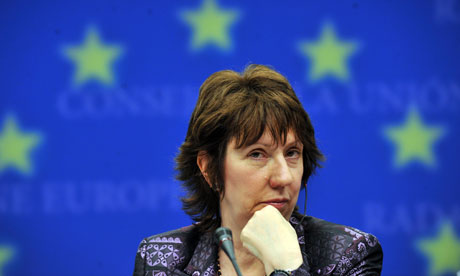Get your act together or risk losing US ally, EU foreign policy chief tells leaders
US will turn its back on transatlantic relationship unless EU develops coherent foreign policy, Catherine Ashton warns

European leaders are to be warned tomorrow morning that America will turn its back on the transatlantic relationship and look elsewhere for key allies unless the EU gets its act together and develops a coherent foreign policy. ¿QUÉ COHERENCIA PUEDE PRETENDERSE CON UN REINO UNIDO FUERA DE LA EUROZONA?
Addressing EU leaders at a Brussels summit tomorrow on the EU's "strategic partnership" with the US, Catherine Ashton, the EU foreign policy representative, will also stress that the EU has to enhance its attractiveness to the Americans by building stronger relationships with Russia, China, Japan, Brazil and Africa. UN CONTINENTE NO ES UN ACTOR DE LA RELACIONES INTERNACIONALES.
In a paper on EU-US relations obtained by the Guardian, ¿FILTRACIÓN O ENTREGA VOLUNTARIA DE ASHTON? Ashton signals that the Europeans have their work cut out if they are to remain relevant to a changing America.
"If we over-promise and under-deliver, if we prioritise process over substance or if we don't know what we want, the US will turn its attention elsewhere," the Ashton paper warns. NO CREO: EEUU NECESITA DE GOBIERNOS EUROPEOS INCLUSO PARA IMPULSAR SU POLÍTICA HACIA ASIÁTICOS, AFRICANOS, LATINOAMERICANOS
It is the Labour peer's first attempt to define what she sees as the key elements of the strategic relationship between the US and Europe.
"When we are an efficient and reliable partner, the US takes us seriously," says the document. "We can best exert our influence vis-à-vis the US by ensuring a unified, capable and self-confident EU."
The plea for greater coherence and consistency comes at a time of division and confusion in how the EU projects power in the world, with Ashton supposed to bring greater clarity and joined-up policies. In her first year, she has faced ample criticism from EU governments for her performance.
Ashton argues tomorrow that the recent midterm elections in the US have brought a shift in the political landscape in Washington and that Europe should play a supporting role in enabling Barack Obama to pursue his aims. CUANDO SEAN LAS NUESTRAS O, POR LO MENOS, CUANDO NOS CONVIENE
"Pressure to reduce US international engagement may increase ... The US needs help to achieve its global objectives. This means an expectation that we can manage our own neighbourhood. The US will continue to value an EU with the means and mindset to act globally."
Ashton proposes that where European and American interests or policies diverge on certain issues, the EU should repackage its aims to make them more attractive to Washington, for example on climate change or on relations between the EU and Nato.
"Rather than forcing the issue with the US in a way which encourages frustration or defensiveness, we could find common ground and achieve more progress by focussing on green growth," she says of differences with Washington on tackling global warming.

 44 votos
44 votos






